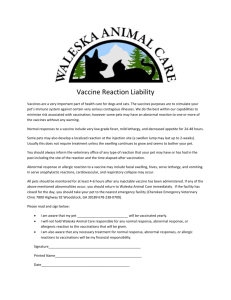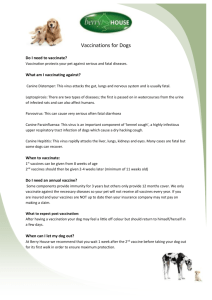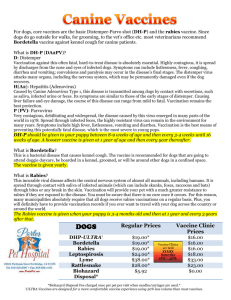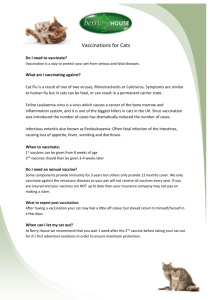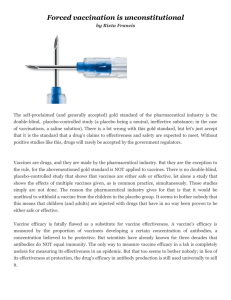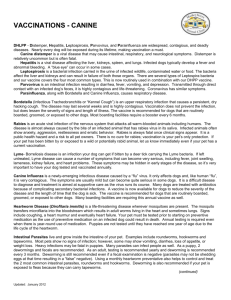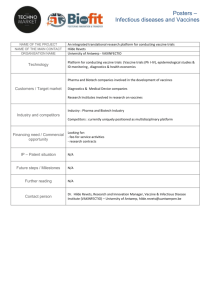Puppy Pak - Beaver Lake Animal Hospital
advertisement
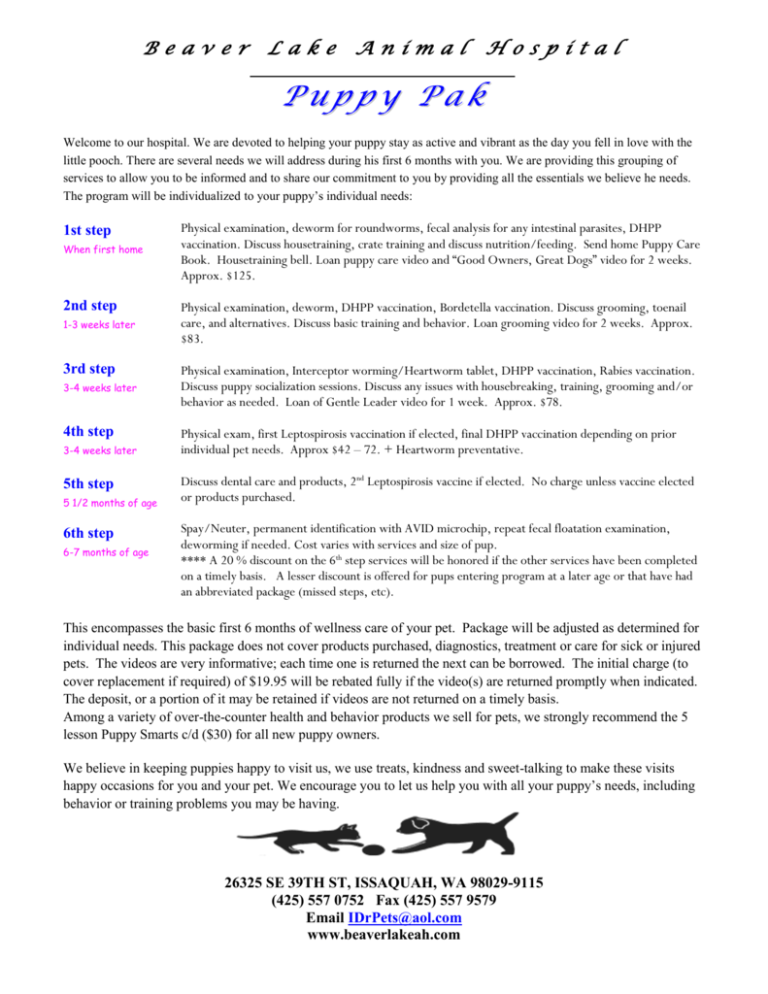
B e a v e r La k e A n i ma l H o s p i ta l Puppy Pak Welcome to our hospital. We are devoted to helping your puppy stay as active and vibrant as the day you fell in love with the little pooch. There are several needs we will address during his first 6 months with you. We are providing this grouping of services to allow you to be informed and to share our commitment to you by providing all the essentials we believe he needs. The program will be individualized to your puppy’s individual needs: 1st step When first home 2nd step 1-3 weeks later 3rd step 3-4 weeks later 4th step 3-4 weeks later 5th step 5 1/2 months of age 6th step 6-7 months of age Physical examination, deworm for roundworms, fecal analysis for any intestinal parasites, DHPP vaccination. Discuss housetraining, crate training and discuss nutrition/feeding. Send home Puppy Care Book. Housetraining bell. Loan puppy care video and “Good Owners, Great Dogs” video for 2 weeks. Approx. $125. Physical examination, deworm, DHPP vaccination, Bordetella vaccination. Discuss grooming, toenail care, and alternatives. Discuss basic training and behavior. Loan grooming video for 2 weeks. Approx. $83. Physical examination, Interceptor worming/Heartworm tablet, DHPP vaccination, Rabies vaccination. Discuss puppy socialization sessions. Discuss any issues with housebreaking, training, grooming and/or behavior as needed. Loan of Gentle Leader video for 1 week. Approx. $78. Physical exam, first Leptospirosis vaccination if elected, final DHPP vaccination depending on prior individual pet needs. Approx $42 – 72. + Heartworm preventative. Discuss dental care and products, 2nd Leptospirosis vaccine if elected. No charge unless vaccine elected or products purchased. Spay/Neuter, permanent identification with AVID microchip, repeat fecal floatation examination, deworming if needed. Cost varies with services and size of pup. **** A 20 % discount on the 6th step services will be honored if the other services have been completed on a timely basis. A lesser discount is offered for pups entering program at a later age or that have had an abbreviated package (missed steps, etc). This encompasses the basic first 6 months of wellness care of your pet. Package will be adjusted as determined for individual needs. This package does not cover products purchased, diagnostics, treatment or care for sick or injured pets. The videos are very informative; each time one is returned the next can be borrowed. The initial charge (to cover replacement if required) of $19.95 will be rebated fully if the video(s) are returned promptly when indicated. The deposit, or a portion of it may be retained if videos are not returned on a timely basis. Among a variety of over-the-counter health and behavior products we sell for pets, we strongly recommend the 5 lesson Puppy Smarts c/d ($30) for all new puppy owners. We believe in keeping puppies happy to visit us, we use treats, kindness and sweet-talking to make these visits happy occasions for you and your pet. We encourage you to let us help you with all your puppy’s needs, including behavior or training problems you may be having. 26325 SE 39TH ST, ISSAQUAH, WA 98029-9115 (425) 557 0752 Fax (425) 557 9579 Email IDrPets@aol.com www.beaverlakeah.com Vaccination Information This note is to inform you of our vaccination protocols and issues that should be considered before pets are vaccinated. I have instituted vaccine protocol changes based on current research and recommendations from the VaccineAssociated Feline Sarcoma Task Force (Task Force) that is supported by the American Veterinary Medical Association, the American Animal Hospital Association, The American Association of Feline Practitioners and the Veterinary Cancer Society. As a veterinarian, I want my patients to stay as healthy as possible. I do not want to see infectious disease increase. However, I also want to reduce the negative effects of over-vaccination. Vaccines have provided us with great protection from specific infectious diseases. In the past, it was felt that dogs and cats had greater exposure to these infectious diseases; so to protect them we vaccinated them annually. We have determined that many of our vaccinations are providing immunity for much longer than one year when strategically administered. Determining the length of immunity is a complex issue, one of which there is not a final answer. There are many manufacturers, types of vaccines and preparation form. Currently, most manufacturers recommend revaccination at yearly intervals. Some manufacturers are issuing notice of particular vaccine products producing a 3-year duration of immunity. Not all vaccines or pets are created equal. Some vaccinations have been implicated to having higher adverse reaction rates. Some pets will have idiosyncratic reactions to vaccination. To summarize, some pets react very strongly to vaccines. Some will spike fevers and/or have a reaction similar to humans who are allergic to bee stings, reactions strong enough to cause death. Some pet’s immune systems will stimulate abnormally and may lead to immune mediated disease such as immune mediate hemolytic anemia (IMHA). It should be noted that IMHA may be stimulated by causes other than vaccinations. Additionally, a specific and uncommon cancer called “fibrosarcoma” is associated with the sites where vaccines have been administered. Most of these vaccine site cancers have been found in cats. Again, these vaccine site cancers are rare to uncommon in cats, and even rarer in dogs. Core vaccines for dogs include Distemper, Hepatitis, Parainfluenza and ParvoVirus (DHPP) for dogs. We recommend puppies have this vaccine at approximately 7-8 weeks old, then again in 3 and 6 weeks later. I currently repeat this vaccine yearly until the dog is 2 ½ years old, then I readminister it every 2-3 years thereafter. Leptospirosis is a component that we used to include in the core vaccines. However, we found that many of the vaccine reactions we saw in dogs were from the Lepto component. With that knowledge, many veterinarians discontinued using this vaccine. While cases of Leptospirosis are uncommon in our area, the disease is again beginning to emerge. Leptospirosis is a bacterial disease. There are several types of this bacterium. People and dogs can both become infected with these bacteria if they are exposed to the urine of certain small furry animals such as rodents and raccoons that are infected with the bacteria. The disease can cause kidney failure. A specific vaccine is required to protect against each type. We offer vaccination against Leptospirosis, but do not require it. We will not use it until a pup is older than 12 weeks old. We provide a handout to owners to help determine whether we will use that vaccine or not in their pup. Per current recommendations, I do not vaccinate against Corona virus in dogs or cats. According to the literature, in dogs, this virus primarily affects pups less than 6 weeks old, and is not a significant disease in otherwise healthy puppies or dogs. We do not carry or use the Giardia vaccine. The vaccine tends to increase the carrier state of infection, putting your family at greater risk. Giardia is a treatable infection. I do not carry or recommend vaccination against Lymes disease for several reasons. We do not live in a Lymes disease endemic area, the vaccine against it is related to a higher degree of post-vaccinal diseases (worse than the disease itself), most of our pets have low exposure to ticks, and the disease is treatable with proper antibiotics. I recommend vaccination for Bordetella Bronchiseptica (Kennel Cough) (Infectious TracheoBronchitis) two or three times yearly, as the immunity for this common and troublesome disease is short lived (less than one year). Ideally, this vaccine is given 2 weeks prior to boarding. There is information that the strain of Bordetella in our current vaccines is not covering all the strains of Kennel Cough. That may be so, but, in my clinical experience, I have found that vaccinating 2 times yearly is effective for most pets to prevent the disease. I do not enjoy administering this vaccine. I also do not enjoy treating the disease in under vaccinated dogs. Rabies vaccine for dogs and cats will be administered based on our state law requirements. The initial rabies vaccine given as a pup will be repeated 1 year later, and thereafter every 3 years. Given that rabies is a zoonosis (a disease shared by both man and animals), I require all patients be kept current with rabies vaccine administered in compliance with Washington State regulations. Vaccination should be a serious medical decision. Although we may make it look like a simple ‘shot’ there are many variables that we have considered. Pets should only be vaccinated when they appear healthy upon physical exam. Giving vaccines to sick or infected pets may not help the pet, and may put the pet at risk for other problems. Since vaccines are meant to stimulate the immune system, giving the pet too many vaccines at one time can cause problems. We take careful consideration in selecting the manufacturers and components of our vaccines. As well, we ensure proper transportation, storage and handling of vaccination products. You should allow your pet to only be vaccinated by trained veterinary staff with vaccines that have been chosen for their known effectiveness. You should only allow vaccines to be given to your pet if you are satisfied the vaccine product has been properly handled and refrigerated from manufacturer to administration. 1/22/06
